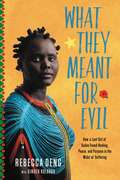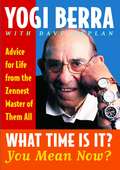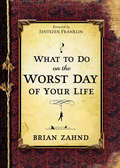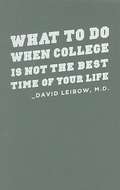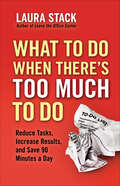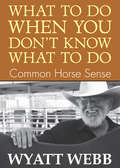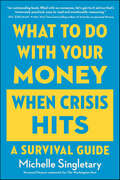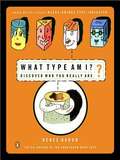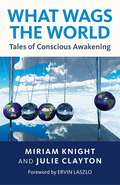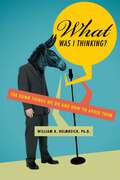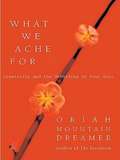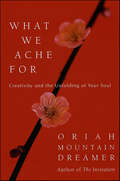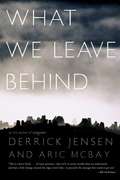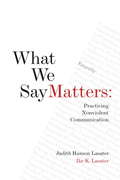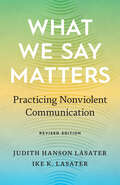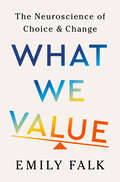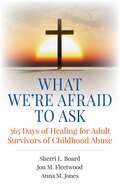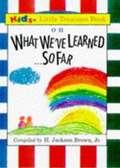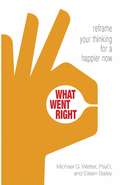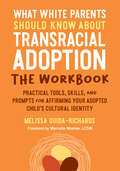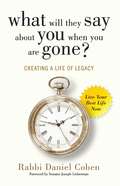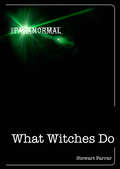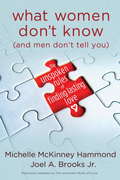- Table View
- List View
What They Meant for Evil: How a Lost Girl of Sudan Found Healing, Peace, and Purpose in the Midst of Suffering
by Rebecca DengMany stories have been told about the famous Lost Boys, but now for the first time, a Lost Girl shares her hauntingly beautiful and inspiring story. One of the first unaccompanied refugee children to enter the United States in 2000, after South Sudan's second civil war took the lives of most of her family, Rebecca's story begins in the late 1980s when, at the age of four, her village was attacked and she had to escape. WHAT THEY MEANT FOR EVIL is the account of that unimaginable journey. With the candor and purity of a child, Rebecca recalls how she endured fleeing from gunfire, suffering through hunger and strength-sapping illnesses, dodging life-threatening predators-lions, snakes, crocodiles, and soldiers alike-that dogged her footsteps, and grappling with a war that stole her childhood. Her story is a lyrical, captivating portrait of a child hurled into wartime, and how through divine intervention, she came to America and found a new life full of joy, hope, and redemption.
What Time Is It? You Mean Now?
by Yogi Berra Dave KaplanCould Confucius hit a curveball? Could Yoda block the plate? Can the Dalai Lama dig one out of the dirt? No, there is only one Zen master who could contemplate the circle of life while rounding the bases. Who is this guru lurking in the grand old game? Well, he's the winner of ten World Series rings, a member of both the Hall of Fame and the All-Century Team, and perhaps the most popular and beloved ballplayer of all time. And without effort or artifice he's waxed poetic on the mysteries of time ("It gets late awful early out there"), the meaning of community ("It's so crowded nobody goes there anymore"), and even the omnipresence of hope in the direst circumstances ("It ain't over 'til it's over"). It's Yogi Berra, of course, and in What Time Is It? You Mean Now? Yogi expounds on the funny, warm, borderline inadvertent insights that are his trademark. Twenty-six chapters, one for each letter, examine the words, the meaning, and the uplifting example of a kid from St. Louis who grew up to become the consummate Yankee and the ultimate Yogi.
What To Do On The Worst Day Of Your Life
by Brian ZahndNobody knew adversity like King David. He was called and anointed to reign in life, and yet he had to find a way in God to keep form losing it all. In What to Do on the Worst Day of Your Life,Brian Zahnd looks into the life of David to discover a pattern of faith we can apply to overcome life&’s daunting obstacles. In David&’s story we find a timeless model for how to encounter God&’s restorative power in the midst of deep tragedy. Join Brian Zahnd, and see what David did on his worst day. You&’ll see David weep but not get bitter. You&’ll see him reorient his vision and regain his passion. All along the journey you&’ll be reminded that God&’s great work in David&’s life was not an odd, one-off miracle but a pattern of faith for all who are facing the worst day of their life.
What To Do When College Is Not The Best Time Of Your Life
by David LeibowIf college is supposed to be the best time of our lives, why are so many students unhappy? What causes a well-adjusted and academically successful high school graduate to suddenly flounder when he reaches college? Why might she start to binge on alcohol or engage in unsatisfying hook-ups? Where does the anger and self-doubt come from, and why is it directed at loving parents? Drawing on years of experience treating college-age youth, Leibow provides practice-based answers to these and other pressing questions. Instead of adventure, liberation, and a triumphant march into adulthood, many college students experience humiliation, insecurity, and social and academic failure. Yet by understanding themselves better and adjusting their perspectives, students can grow from these challenges and turn bad choices into wiser personal and educational decisions. Leibow focuses on issues common to college settings& —anxiety and depression, drug and alcohol abuse, overwhelming course loads, homesickness, eating disorders, and unhealthy relationships& —detailing coping strategies and professional resources that best respond to each crisis. Leibow's intimate knowledge of campus life and its unique challenges add an invaluable dimension to his prescriptive advice. Reorienting the expectations of parents and students while providing the tools for overcoming a variety of hurdles, Leibow shows how college can still become one of the best times of our lives.
What To Do When There's Too Much To Do: Reduce Tasks, Increase Results, and Save 90 Minutes
by Laura StackWhat to tackle and what to toss: &“I don&’t know anyone who is more organized or who has more energy and has more fun getting things done than Laura Stack.&” —Mark Sanborn, New York Times–bestselling author of You Don&’t Need a Title to Be a Leader There is a set of skills that make it possible to not only effectively manage a whirlwind of daily tasks but breathe easier in the process. In this book, Laura Stack—aka the Productivity Pro—explains each skill, and how to develop it. Learn how to: Determine what to do Schedule time to do it Focus your attention Process new information Close the loop Manage your capacity These techniques can be applied in your personal life as well as your work life—to free up time, reduce anxiety, and achieve more while doing less.
What To Do When You Don't Know What To Do: Common Horse Sense
by Wyatt WebbThis remarkable book speaks to our current stressful, fear-based mode of existing by offering simple, common-sense solutions that lead toward sanity and joy. And the wonderful thing is that these methods are available to us all in present-moment time. Wyatt Webb sticks to his belief that the cause of our most difficult struggles in this life are two things we’re not born with: fear and self-doubt. Since these two conditions are learned, there is definitely hope for overcoming them via the process of unlearning and relearning, which is at our intellectual, emotional, and spiritual fingertips. We’re able to move from the perception of being stuck by availing ourselves of the simple yet profound tools offered in this book. For one-tenth the cost of a therapy session, you can access the map to freedom. What have you got to lose?
What To Do With Your Money When Crisis Hits: A Survival Guide
by Michelle SingletaryFrom pandemics to recessions, bear markets to energy crises, life is full of financial setbacks. The hard truth is that it&’s not a matter of if there will be another economic downturn, but when. The important question to ask is this: how do you prevent a crisis from turning into a full-blown catastrophe? Drawing on years of experience as an award-winning personal finance columnist, Michelle Singletary shares her expert advice for weathering a financial storm. In this book, she answers the most pressing questions that crop up when money suddenly becomes scarce, like: What bills need to be paid first?When is it right to dip into savings?What are the best ways to cut back on spending?How do you keep from panicking when the stock market is down? Is this &“opportunity&” a scam in disguise? This hands-on guide covers debt concerns, credit card issues, cash-flow problems, and dozens of other common financial matters. Whether you&’re in the midst of one crisis or preparing for the next, this book provides the tools to secure your wealth and your future.
What Type Am I?: Discover Who You Really Are
by Renee BaronThe Myers-Briggs Type Indicator (MBTI) is the most widely used psychological indicator in the world. Millions of people take the test annually. Now a family therapist explains this fascinating system of ideas to the public in a way that is entertaining and easy to absorb. Based on the work of Carl Jung, the MBTI is a system that discusses people's individual preferences on four basic scales: how they relate to the world, take in information, make decisions, and manage their lives. Renee Baron takes on the complexity of the sixteen personality types and makes them accessible so the general reader can comprehend them, find their own type, and use the knowledge to enrich their own lives. She presents information about individual strengths and weaknesses along with suggestions for personal growth and awareness. Insightful, helpful, and encouraging, What Type Am I? is the only user-friendly guide to the MBTI'and an eminently useful step in helping individuals appreciate, and apply their strength, to work, love, and life. Baron has co-authored two bestselling books: Are You My Type, Am I Yours and The Eneagram Made Easy
What Wags the World: Tales of Conscious Awakening
by Miriam Knight and Julie ClaytonWhat Wags the World: Tales of Conscious Awakening is a topical and compelling collection of conscious awakening stories from more than 30 authors and filmmakers. Each contributor describes life-changing experiences that resulted in extraordinary transformation within their own life, and realizations of an interconnected and multidimensional universe. Their understanding of the world and how it works has been so profoundly changed that they feel compelled to share their story and pass on the gifts of wisdom, insight, and compassion they have gained.
What Was I Thinking?: The Dumb Things We Do and How to Avoid Them
by William B. HelmreichIn this in-depth exploration of the dumb things we all do and why, Helmreich sheds new light on the well-known foibles of Martha Stewart, Bill Clinton, Britney Spears, Don Imus, Eliot Spitzer, Tiger Woods and Bernie Madoff, as well as common missteps like road rage, telling your boss off, cheating, shoplifting, and lying. But this is far more than an entertaining read. Based on hundreds of interviews and exhaustive research, Helmreich concludes that this behavior isn&’t only a result of psychological problems. It&’s also based on our very culture, history, and values. Only when we understand these causes, the author says, can we begin to address our behavior and improve our lives.
What We Ache For: Creativity and the Unfolding of Your Soul
by Oriah Mountain DreamerInspirational guide to awakening personal creativity in any art form. Dreamer uses practical examples to convey the link between creativity, spirituality, and sexuality while showing how all 3 can enrich one's life.
What We Ache For: Creativity and the Unfolding of Your Soul
by Oriah Mountain DreamerIn her previous books, Oriah Mountain Dreamer has challenged readers to live with passion and honesty, to embrace the true, fallible, human self. What We Ache For is a moving and eloquent call to delve deeply into our creative selves, to do our creative work, and offer it to the world.The creative process is essential to human nature. It is as essential as spirituality and sexuality, and in fact all three are deeply intertwined. What We Ache For is a practical book allowing readers to embrace the urgency and necessity of their creativity, whatever their medium -- writing, painting, sculpture, dance, music, or film. As Oriah says, "Doing creative work allows us to follow the thread of what we ache for into a deeper life, offering us a way to cultivate a life of making love to the world."Following Oriah through this journey in such chapters as "The Seduction of the Artist," "Learning to See," and "Risk and Sacrifice," What We Ache For challenges and inspires readers to fully embrace their artistic selves as a way of forging a path of spiritual unfolding.
What We Leave Behind
by Derrick Jensen Aric McbayWhat We Leave Behind is a piercing, impassioned guide to living a truly responsible life on earth. Human waste, once considered a gift to the soil, has become toxic material that has broken the essential cycle of decay and regeneration. Here, award-winning author Derrick Jensen and activist Aric McBay weave historical analysis and devastatingly beautiful prose to remind us that life--human and nonhuman--will not go on unless we do everything we can to facilitate the most basic process on earth, the root of sustainability: one being's waste must always become another being's food.
What We Say Matters
by Judith Hanson Lasater Ike K. LasaterFor yoga teacher Judith Hanson Lasater and her husband, mediator Ike K. Lasater, language is a spiritual practice based on giving and receiving with compassion. In What We Say Matters, they offer new and nurturing ways of communicating. Long-term students of yoga and Buddhism, the authors here blend the yoga principle of satya (truth) and the Buddhist precept of right speech with Marshall Rosenberg's groundbreaking techniques of Nonviolent Communication (NVC) in a fresh formula for promoting peace at home, at work, and in the world. The authors offer practical exercises to help readers in any field learn to diffuse anger; make requests rather than demands or assign blame; understand the difference between feelings and needs; recognize how they strategize to get needs met; choose connection over conflict; and extend empathy to themselves and others.
What We Say Matters
by Judith Hanson Lasater Ike K. LasaterFor yoga teacher Judith Hanson Lasater and her husband, mediator Ike K. Lasater, language is a spiritual practice based on giving and receiving with compassion. In What We Say Matters, they offer new and nurturing ways of communicating. Long-term students of yoga and Buddhism, the authors here blend the yoga principle of satya (truth) and the Buddhist precept of right speech with Marshall Rosenberg's groundbreaking techniques of Nonviolent Communication (NVC) in a fresh formula for promoting peace at home, at work, and in the world. The authors offer practical exercises to help readers in any field learn to diffuse anger; make requests rather than demands or assign blame; understand the difference between feelings and needs; recognize how they strategize to get needs met; choose connection over conflict; and extend empathy to themselves and others.
What We Say Matters
by Judith Hanson Lasater Ike K. LasaterFor yoga teacher Judith Hanson Lasater and her husband, mediator Ike K. Lasater, language is a spiritual practice based on giving and receiving with compassion. In What We Say Matters, they offer new and nurturing ways of communicating. Long-term students of yoga and Buddhism, the authors here blend the yoga principle of satya (truth) and the Buddhist precept of right speech with Marshall Rosenberg's groundbreaking techniques of Nonviolent Communication (NVC) in a fresh formula for promoting peace at home, at work, and in the world. The authors offer practical exercises to help readers in any field learn to diffuse anger; make requests rather than demands or assign blame; understand the difference between feelings and needs; recognize how they strategize to get needs met; choose connection over conflict; and extend empathy to themselves and others.
What We Say Matters: Practicing Nonviolent Communication
by Judith Hanson Lasater Ike K. LasaterLearn how to communicate with compassion and choose language that reflects your personal values and aims with this essential guide to Nonviolent Communication.Judith Hanson Lasater and Ike Lasater, long-term students of yoga and Buddhism, had studied the concepts of satya (truth) and the Buddhist principle of right speech for years but it was not until they began practicing Marshall Rosenberg&’s techniques of Nonviolent Communication (NVC) that the concept of speech as a spiritual practice became real for them. In What We Say Matters, the authors describe their personal journey through NVC, and detail how speech becomes a spiritual practice when you give and receive with compassion all the time--at home, at work, and in the world. They introduce the basics of NVC with clear explanations, personal examples, exercises, and resources. Some of the skills you&‘ll learn include: Extending empathy to yourself and others Distinguishing between feelings and needs Making requests rather than demands Creating mutually satisfying outcomes And many moreThis new edition includes updated resources and a preface by Judith Hanson Lasate.
What We Value: The Neuroscience of Choice and Change
by Emily FalkA neuroscientist reveals the hidden calculations that shape our daily decisions—and how to make more fulfilling, impactful choices in our work, relationships, and lives. With so many competing priorities pulling us in different directions every day—family, friends, work, our health—it can feel difficult to make decisions that are aligned with what we care about most. Especially in the moment, we often default to the immediate demand, the path of least resistance, the worn old habit we wanted to change. In What We Value, pioneering scholar Emily Falk reveals how we can transform our relationship with the daily decisions that define our lives—opening pathways to make more purposeful, fulfilling choices; more successfully change our behavior; and influence others to see differently—by thinking like neuroscientists. Drawing on her own award-winning research, Falk introduces readers to a new paradigm for understanding why we, and those around us, do what we do. This is the value calculation: the often-subconscious mechanism by which the brain computes our everyday choices. By learning how it works, Falk shows, we can learn to work more strategically with it—whether we want to embrace new activities and behaviors, connect more meaningfully with others, or become more effective leaders in our organizations and communities. With captivating stories of star comedians, journalists, sports legends, and more, Falk demonstrates how we can change what we think just by changing what we think about; get less defensive by connecting with our core values; and seed innovation by seeking out different perspectives. Whether deciding on something as small as what to eat for lunch or as big as what career to pursue, we can have more agency and flexibility than we might think. What We Value is a groundbreaking guide to finding new possibilities in our choices—and the lives we ultimately make with them.
What We're Afraid to Ask: 365 Days of Healing for Adult Survivors of Childhood Abuse
by Sherri L. Board Jon M. Fleetwood Anna M. JonesWhat We&’re Afraid to Ask is a must-read for survivors of childhood abuse who struggle to reconcile their faith with their past. Board, Fleetwood, and Jones demonstrate how Christianity offers reasonable, honest, and encouraging answers to difficult questions regarding abuse while focusing the reader&’s attention biblically and psychologically toward Jesus Christ, in whom there is infinite hope.
What We've Learned So Far
by H. Jackson Brown Jr.All of us have had a great teacher at some time. Mine was Miss Mitchell. She was my first-grade teacher, and what I remember best was that she never criticized the colors I used when I drew. "That's lovely," she would say, and my little fingers would eagerly pick up a crayon to draw another purple horse. Partly because of her, I have never been reluctant to take chances. And then there was Coach Hood who thought I could play first string even though I was twenty pounds lighter than the rest of the squad. In the first game of the season, I ran for two touchdowns. I still carry with me the newfound confidence I felt walking off the field that afternoon. Thank you, Coach Hood. Then there is the one teacher we all share--the oldest, wisest, and most demanding. When Experience stands at the head of the class, we all pay attention. How do you make a girl go crazy? What really happens when you lick a slug? Some lessons cannot be found in books. We quickly learn that cars roll down steep driveways when the emergency brakes are released and that, nine times out of ten, a tall person will sit in front of a short one at the movies. But sometimes hope triumphs over experience--for there are a few of us who, regardless of how many times we've been disappointed by the picture on the box, still buy the cereal with the toy inside.
What Went Right: Reframe Your Thinking for a Happier Now
by Eileen Bailey Michael G. WetterLearn to change the self-critical stories in your mind and rewire your brain so that you gain the self-confidence to build more fulfilling relationships, careers, and social life.Since childhood, our experiences and interactions have shaped the running narrative of who we are and how we view ourselves. When those interactions are painful, many of us have a tendency to internalize the negativity, translating mean or selfish messages given to us by family, friends, or teachers during our youth into truths about who we are—our flaws, failures, and shortcomings.Through practical and easy-to-understand principles and techniques, What Went Right teaches you to recognize and intervene on self-defeating thought processes and uncover your core beliefs about who you really are. Through these exercises, you will learn how your thoughts drive feelings that influence your behaviors. By changing your thinking, you can unlock self-affirming feelings and actions needed to create your new life story and become the person you want to be.
What White Parents Should Know about Transracial Adoption--The Workbook: Practical Tools, Skills, and Prompts for Affirming Your Adopted Child's Cultural Identity
by Melissa Guida-RichardsA companion to What White Parents Should Know about Transracial Adoption, this practical workbook guides readers to better understand transracial adoption and do the work of anti-racist, trauma-informed parenting.A must-read for white parents who have transracially adopted or prospective parents considering transracial adoption, this follow-up to What White Parents Should Know about Transracial Adoption offers a wealth of activities, templates, and questions for self-reflection. Melissa Guida-Richards, who learned at the age of 19 that she was adopted from Colombia as an infant, addresses the complexities of transracial adoption with insight, compassion, and the wisdom of lived experience. Through thought-provoking questions and activities, Guida-Richards guides you to:Consider the role of infant-mother bonding and understand developmental trauma in adopteesUnderstand the complex history of adoption; recognize illegal and unethical practices, such as trafficking operations and baby factories; and ask the important questions when working with adoption agenciesLook more deeply at implicit bias, white saviorism, and white fragilityLocate and utilize adoption-competent mental health careOffer culturally aligned education, community, and resources to your childAcknowledge the effects of racism and celebrate your child&’s race and cultureThroughout the workbook, Guida-Richards guides you to break free from toxic positivity, understand and drop defenses, engage in difficult conversations, and learn to listen to your child&’s experience. Whether you are a potential parent considering a transracial adoption, a parent of an adopted child, or a therapist or advocate working with adoptive families, this practical and engaging workbook will help you &“do the work&” of furthering anti-racist, child-centered, and trauma-informed parenting.
What Will They Say About You When You're Gone?: Creating a Life of Legacy
by Rabbi Daniel Cohen"This book is a beacon of light and a touchstone for the timeless values of leading a purposeful life." --From the Foreword by Senator Joseph Lieberman There's not one person alive who hasn't confronted their own mortality. Each of us, at some point, wakes up to the reality that our time on Earth is limited. But how do we lead our lives with a sense of urgency every day? How do we develop the courage to make choices not based on pressure but on principle? How do we create the sacred space to reflect on who we are and who we want to be so we can realize our innermost goals and dreams? What Will They Say About You When You're Gone? points the way. Esteemed Rabbi Daniel Cohen will help you rise above the distractions to tap into the best version of yourself. Through a unique blend of storytelling, practical exercises, and profound wisdom, he will teach you seven transformative principles to reverse engineer your life so that you are living with purpose and passion, so that the person you are today more closely aligns with the person you aspire to be.
What Witches Do: A Modern Coven Revealed (The Paranormal)
by Stewart FarrarAn excellent behind-the-scenes account, with intimate and entertaining revelations.
What Women Don't Know (and Men Don't Tell You): The Unspoken Rules of Finding Lasting Love
by Michelle Mckinney Hammond Joel A. Brooks Jr.What You Don't Know about Yourself Will Hinder You. What You Don't Know about Men Will Hurt You. What You Don't Know about Relationships Will Cost You. Why does the modern-day search for romance so often end in disappointment, especially for women? Is it something we do? Something we don't do? Are we missing important information about the opposite sex-or about ourselves? Is there something wrong with us that we long so desperately for "til death do us part"? Sadly, many women today see their ongoing singleness as a weakness or lack of worth. In truth, our dreams go unfulfilled not because we do not deserve for them to come true, but often because of wrong assumptions-assumptions that can easily be corrected. Drawing on both male and female perspectives, this book deals with the hard issues and questions you and other women ponder as you consider how to obtain lasting love. What Women Don't Know (and Men Don't Tell You) will help you adjust your desires, redefine what you are attracted to, set your values in order, and determine your goals-freeing you at last to pursue the loving relationship you desire.
